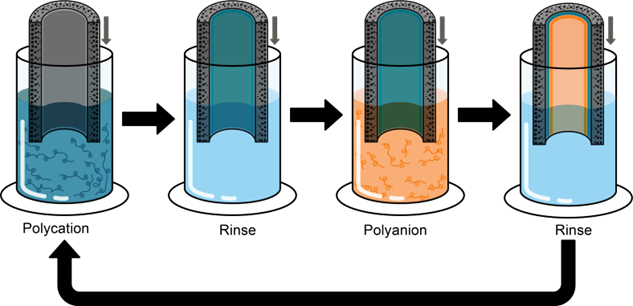Dense and highly stable polyelectrolyte multilayer membranes for brackish water treatment
- Persons involved: Sina Rezaei (PhD Candidate), Wiebe de Vos (promotor), Esra te Brinke (supervisor)
- Duration: 2023-2027
- Funding: NX Filtration, TKI Chemistry
Introduction
Water scarcity is a pressing challenge for many countries worldwide. And the problems are only increasing due to growing populations, increasing industrial demands, and climate change. The need for clean water to sustain life and foster economic growth has drawn our attention toward new water sources, such as brackish water, which is saltier than freshwater but not as saline as seawater. However, extracting potable water from this source requires advanced water treatment technologies.
Nanofiltration (NF) and reverse osmosis (RO) have shown considerable promise among these technologies. They employ semi-permeable membranes to separate undesirable contaminants from water, providing a feasible solution to enhance water supplies. However, the conventional reverse osmosis/nanofiltration treatment poses several challenges, including high energy requirements for operation and membrane fouling issues. Membrane fouling, which results from accumulating particles and organic matter on the membrane surface, reduces the system's efficiency and increases maintenance costs.
A promising solution has emerged in response to these challenges: a novel hollow fiber membrane based on polyelectrolyte multilayer membranes. These membranes leverage the properties of polyelectrolytes - polymers that carry multiple positive or negative charges - to create sophisticated filtration layers. So far, this has led to very promising nanofiltration membranes, but we believe it can also lead to membranes with RO-type performance. The hollow fiber design increases the membrane's surface area to volume ratio and makes the membranes less susceptible to fouling, improving their performance. Moreover, the ultrathin polyelectrolyte layers could reduce the energy required for filtration and withstand high salinity conditions and chemical cleaning steps.
Key words
Polyelectrolytes, nanofiltration, dense and stable membranes, water scarcity
Technological challenges
Polyelectrolyte Multilayer Membranes currently exhibit excellent rejection capabilities for pollutants. However, when it comes to NaCl retention, their retention tends to be low. While this low NaCl retention is an advantage when filtrating fresh water, it needs to be increased to make it relevant for brackish water treatment. In this project, we're exploring innovative approaches to enhance these membranes, making them denser and more stable, aiming to achieve improved selectivity and a higher rejection rate for NaCl. Our ultimate goal is to advance brackish water treatment, ensuring a safer and cleaner water supply.
Research goal
The main goal of this project is to develop a Dense and stable PEM-based NF membrane for use in brackish water treatment.

Layer-by-layer coating of polyelectrolytes multilayers on the support membrane

